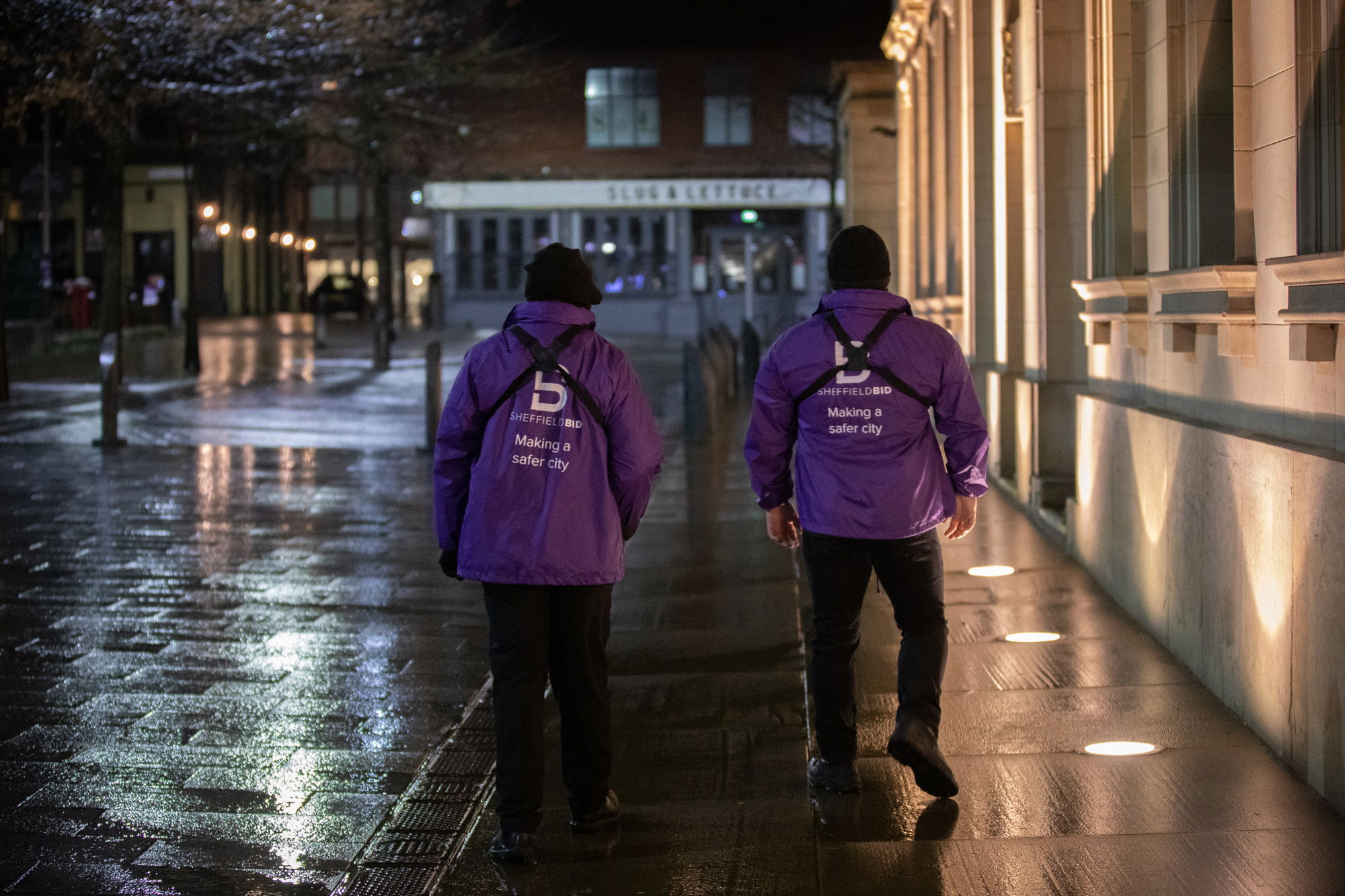
A safer city centre for all
Sheffield BID recognises the need for real security improvements to make our streets safer. Government budget cuts, reduced policing numbers, rising anti-social behaviour, and shifting priorities have left city centre communities vulnerable to economic downturns and urban decline. In response, we’ve developed a comprehensive programme of safety, security, and support initiatives to protect businesses, visitors, and vulnerable individuals.
Street team initiatives
Clean Team: Provides additional cleaning support in areas affected by graffiti, rough sleeper detritus, sharps, and hazardous waste.
Security Team: Introduced during the Coronavirus lockdown to monitor premises overnight. This service returns during peak periods to support business safety.
Reporting and intelligence: Acts as the BID’s “eyes and ears,” reporting environmental issues and anti-social behaviour, sharing intelligence with police, and connecting rough sleepers to support services.
Business Crime Reduction Partnership (BCRP)
Radio scheme: BID funding has upgraded the city centre’s crime prevention radio network to a fully digital system.
Data sharing: Through NBCS membership, we support multi-agency data sharing to reduce crime and risk.
Promoting best practices in place management
Best Bar None: Delivered in partnership with local venues to promote safe and responsible licensing.
Purple Flag: Maintained in collaboration with South Yorkshire Police and Sheffield City Council, recognising excellence in managing the night-time economy.
Safe Square: A seasonal initiative providing medical and welfare support to those enjoying a night out.
Supporting charities and addressing homelessness
Help Us Help: Raising awareness of support services and encourages informed giving.
Employment initiatives: Creating paid roles for former rough sleepers, offering a sustainable route out of homelessness.
Fundraising: Supporting charities like Roundabout and the Street Pastors who assist vulnerable individuals.
Assisting businesses affected by vagrancy
Rough Sleeper patrols: Delivered by South Yorkshire Police to check welfare and reduce business disruption.
Sanitation services: Follow-up cleansing in areas regularly affected by rough sleeper activity.
Building business resilience
Major incident training: Includes anti-terror and emergency response sessions via Project Argus and Project Griffin.
Conflict management: Specialist training for frontline staff dealing with unpredictable behaviours.
Management training: Equips teams with strategies to minimise and manage conflict.
Additional security measures
Mobile cameras: Used to monitor hotspots and deter anti-social behaviour.
SmartWater®: Distributed to night-time venues as a deterrent against serious offences.
Security advice: Delivered by Crime Prevention Officers to design out crime.
Graffiti prevention: Includes the Bag A Tagger campaign with Crimestoppers to identify offenders and seek restitution.
Coordinated police operations
Project Servator: BID teams contribute intelligence to support police operations that disrupt criminal activity and reassure the public.
Life-saving equipment
Defibrillators: 13 outdoor units installed through the Pulse Points initiative.
Bleed Control Cabinets: 12 emergency kits installed in partnership with the Daniel Baird Foundation and night-time economy leaders.
Public Spaces Protection Order (PSPO)
Following sustained lobbying by Sheffield BID and its members, a new PSPO was implemented in April 2025 to tackle anti-social behaviour. The order will remain in place for three years, supporting a safer, more welcoming city centre.
Reporting and useful contacts
- BCRP and radio system: Rob Cowley, Business Crime Manager at Sheffield City Council. Email: rob.cowley@sheffield.gov.uk or telephone 0114 474 1712.
- ASB and Community Safety teams: ASB@sheffield.gov.uk and commsafety@sheffield.gov.uk
- Neighbourhood Police team: SheffieldCityCentreNPT@southyorks.pnn.police.uk
- Council city centre ambassadors: 7 days a week (excluding bank holidays). Monday to Saturday: 07:30 – 20:00 Sunday: 07:30 – 18:00 Contact: 0114 2736895 (Mon-Fri 08:00-17:00) or 07736 477122 (operational hours).
- Rough Sleepers: Concerns about people sleeping rough can be reported to the Sheffield Street Outreach Team via Street Link – telephone 0800 066 5358 or text SOTS to 80800. More information about the charities who support people on the streets can be found at www.helpushelpsheffield.uk.
- Graffiti:
- Taggers and vandalism: If you know who is adding the graffiti, please call 101 or Crimestoppers on 0800 555 111.
- Graffiti on Highways infrastructure and Public Realm: Report to Sheffield City Council: Report graffiti | Sheffield City Council
- Graffiti on commercial premises: Report as a crime via 101 so that it can be investigated. If your business is a member of the Council’s radio network, the DISC reporting system also enables you to submit a report to help the BCRP maintain a body of evidence for future prosecutions. Sheffield BID also reports all graffiti in this way.
- Removal of graffiti and cleaning of detritus: Request from Sheffield BID at operations@sheffieldbid.com
“One of the main concerns for staff was they felt intimidated entering and leaving the building because of people congregating around the doorways. Our staff have noticed the improvements and are now feeling safer and more confident because of the reduced number of incidents. I thank Sheffield BID for the work done to support us. It has made a real difference. You listened to our concerns, provided regular communication and implemented an appropriate solution.”
Lucie Barlow, CEO
The Good Things Foundation


